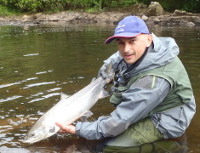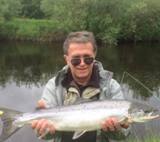Vous n'êtes pas connecté.
Annonce
Le forum du Club des Saumoniers comporte trois parties :
Modérateurs : Artza64 , gerard vieille hardy , Medram Contact : Webmestre |
30/04/2023 : Suite à une mise à jour du forum pour des raisons techniques et de sécurité, chaque utilisateur doit
faire la demande d'un nouveau mot de passe en cliquant sur "Mot de passe oublié?" sur la page de connexion au forum. Attention, le mail de réinitialisation peut partir dans vos spams. |
#1 23-11-2016 16:05:28
- philippe germain
- Inscrit
- Inscrit(e): 10-02-2011
- Messages: 572
Planète saumon, enquête sur le poisson préféré des français !
Bonjour, ne pas oublier de suivre ce programme sur France 3
Sommaire
http://www.france3.fr/emissions/thalass … 016_521645
1 Résumé
2 L'émission
3 grand format:toxique saumon 12 questions sur le poisson préféré des Français.
cdlt philippe
Dernière édition de: philippe germain (23-11-2016 16:14:46)
la sagesse n'attend pas le nombre des années, quand, coulera une rivière pleine de grands saumons nous serons des rois.
Hors ligne
#2 30-11-2016 11:19:38
- raphaël
- Adhérent

- Localisation: Berry-Nivernais
- Inscrit(e): 12-11-2007
- Messages: 1 822
Re: Planète saumon, enquête sur le poisson préféré des français !
Concernant Salmo salar:
- reportage sur l'élevage axé uniquement sur l'aspect santé humaine, aucune allusion aux dégâts environnementaux;
- reportage sur l'Owenduff et Delphi: on assiste malheureusement à un viandage en bonne et due forme (deux saumons = deux morts et une dégustation en direct) et ensuite l'alevinage massif de la Bundorragha est présenté comme la solution miracle à tous les maux (i.e dans la droite ligne de ton commentaire du 23/11). Aucun commentaire pertinent sur la raréfaction de l'espèce.
A+
Qu'est ce que la civilisation? Une fin en soi, ou un stade avancé de la barbarie? H. Melville
Hors ligne
#3 01-12-2016 13:48:07
Re: Planète saumon, enquête sur le poisson préféré des français !
Bonjour,
ah.. je serais moins sévère que vous. Le sujet n'étais pas le saumon sauvage ni l'environnement mais la qualité du saumon d'élevage, et ce que cache un label bio, sachant que ce sera un des produits les plus vendus pour la fin de l'année.
Si le reportage n'est à mon sens pas complet sur ce sujet, il me semble difficile de lui faire un reproche sur un sujet qu'il n'a pas vocation à traiter.
Perso aussi j'espérais que le sujet soit différent, ce reportage ne restera pas dans les mémoires, c'est tout.
Fabrice
Hors ligne
#4 08-12-2016 20:46:55
- jlpmzy
- Adhérent

- Localisation: Marzy ( Nièvre)
- Inscrit(e): 17-05-2009
- Messages: 685
Re: Planète saumon, enquête sur le poisson préféré des français !
Bonjour
a retenir
LABEL BIO : plus contaminé que le non labellisé à cause de l 'alimentation bio qui comprend plus de farines de poissons ....contaminés
les autres saumons non BIO sont alimentés de manière plus végétarienne !!!!!!!!!
On peut méditer sur le LABEL BIO en général ..............
Si tu as une pomme, que j'ai une pomme, et que l'on échange nos pommes, nous aurons chacun une pomme. Mais si tu as une idée, que j'ai une idée et que l'on échange nos idées, nous aurons chacun deux idées. G B Shaw (1856-1950)
Hors ligne
#5 09-12-2016 20:19:38
- philippe germain
- Inscrit
- Inscrit(e): 10-02-2011
- Messages: 572
Re: Planète saumon, enquête sur le poisson préféré des français !
Bonsoir !! bio ou conventionnel de Norvège d'Ecosse ou d'Ireland jusqu'au au Chili voir petit Français à Cherbourg! le problème de production n'a pas de frontière! quand Marine Harvest financera le NASF et NASCO et aidera nos associations pour le retour de Salmo Salar sur nos rivières on en reparlera!
voir le lien 2014 http://rue89.nouvelobs.com/blog/chemin- … vue-234024
un seul mot ! boycott !!
cdlt philippe
la sagesse n'attend pas le nombre des années, quand, coulera une rivière pleine de grands saumons nous serons des rois.
Hors ligne
#6 02-01-2017 14:00:18
- Sanzel
- Inscrit
- Inscrit(e): 21-10-2006
- Messages: 151
Re: Planète saumon, enquête sur le poisson préféré des français !
Bonjour à tous,
Un article du Sunday Times en date du 1 janvier:
http://www.thetimes.co.uk/edition/scotl … -3rkn5ns9v
Salmon industry toxins soar by 1000 per cent
Mark Macaskill, January 1 2017, 12:01am, The Sunday Times
Between 2006-16, farmed salmon production increased by 35 per cent while the use of chemicals to control flesh-eating lice rose 932 per cent
The use of toxic chemicals to fight sea lice on Scottish salmon farms has soared by almost 1,000% in the past decade, according to offical data that has sparked fresh criticism of the billion-pound industry.
Between 2006-16, farmed salmon production increased by 35% while the use of chemicals to control flesh-eating lice rose 932%.
They included compounds that have been linked to reduced fertility in wild salmon and mortality in shellfish such as lobsters.
Critics of salmon farming said this weekend that the growing use of chemicals to fight sea lice, a parasite that kills millions of farmed fish every year, raises serious questions about the industry’s environmental impact.
It has rekindled calls for some of Britain’s leading supermarkets to ban the sale of farmed salmon from parts of Scotland where sea lice infestations are “rampant” and pose a threat to the survival of wild salmon and sea trout.
“Scottish salmon farming is fighting a losing battle against chemically resistant sea lice,” said Don Staniford of the Global Alliance Against Industrial Aquaculture. “The drugs don’t work anymore. Sadly, Scotland’s lobsters and other shellfish are collateral damage in the salmon farming industry’s war on sea lice.”
The latest figures, obtained under freedom of information from the Scottish Environment Protection Agency (Sepa), show that Scottish salmon farms used 45kg of chemicals in 2006 but this increased to 467kg in 2016.
Since 2002, salmon farmers have carried out almost 8,500 separate chemical treatments with nearly four tonnes of chemicals dumped into the seas around Scotland.
The treatments used by Scottish salmon farms included cypermethrin, a pesticide that was abandoned in 2012 after sea-lice developed resistance. Scientific studies have suggested that it impairs fertility in wild salmon.
Sepa records show that just over two tonnes of azamethiphos, an active ingredient in Salmosan, a popular de-lousing pesticide, has been used in the past decade by salmon farmers. A paper published last month by scientists in Canada raised concern that azamethiphos poses a serious health risk to marine wildlife; tests on lobsters found repeated exposure can impair the nervous system and cause death.
However, Scott Landsburgh, chief executive of Scottish Salmon Producers’ Organisation, the industry’s umbrella body, said all medicines were applied under strict supervision and monitored closely by Sepa.
“Farmed salmon production has been higher in some years since 2002 and medicine amounts have responded accordingly. Salmon farmers use safe and fully approved veterinary medicines to support fish health. All medicines are applied under strict veterinary supervision and application is tightly regulated with Sepa’s official consent.”
Efforts are underway to reduce the use of chemicals to control sea lice, which can cause serious fin damage, skin erosion and deep open wounds that are prone to infection.
Scottish Sea Farms, one of the country’s leading producers of farmed salmon, recently bought a Thermolicer, a £4m delousing device. Fish are pumped into the machine and pass through heated water that kills the lice,
Dr Ralph Bickerdike, SSF head of fish health, said last month: “This has been a real breakthrough in the fight against sea lice – having access to a new tool, which works in a completely different way to our other control measures, is a major achievement for the Scottish Industry.”
There are hopes that the method could reduce the number of fish that perish during factory farming. In 2016, the farmed salmon “mort mountain” is believed to have topped 10m fish.
The industry is also under pressure from campaigners who are lobbying supermarkets to take tougher action against salmon farms where lice infestations are high.
In the run up to Christmas, Salmon & Trout Conservation Scotland challenged the Co-Op and Sainsbury’s to stop selling Scottish farmed salmon from regions in the west Highlands and Islands where sea lice infestation is “rampant”.
ET PUIS aussi , CECI :
PRESS RELEASE
Reykjavik December 28, 2016
Court case initated to repeal Arnarlax salmon farming licences
A court case has been initiated at the Reykjavik District Court to repeal licenses issued earlier this year by MAST (Icelandic Food and Veterinary Authority) and UST (The Environmental agency of Iceland) for Arnarlax salmon farm in the Northwest of Iceland. The case is jointly initiated by several parties that will suffer from salmon farming with fertile salmon stock of Norwegian origin in open sea cages on the Icelandic coast. The parties initiating the case include farmers holding interest in several indigenous trout and salmon rivers in Iceland.
The case will be filed in the Reykjavik District Court January 10, 2017.
The case is built on several arguments, such as:
- Incorrect procedures have been followed when issuing the licenses. Study of the maximum allowable biomass in the fjord is missing as well as a certificate from the guardian of the sea, in this case the State of Iceland. The law prescribes both should be available prior to issuing of the disputed licenses.
- Handing over property of the Icelandic state for use by individuals or companies can only be based on valid law according to the constitution. Law allowing for this has not been adopted.
- The salmon farming in open sea cages on the Icelandic coast with fertile Norwegian strain of salmon is in breach of several laws, including Law on the Conservation of Nature and Law on Fish Farming.
- The disputed salmon farming violates the interests of the parties initiating the case relying on fishing from the native salmon and trout stocks.
It is highly likely that farming in open sea cages with fertile Norwegian salmon stock will permanently harm native Icelandic salmon and trout stocks. The situation in Norway confirms this as few rivers in Norway do have healthy stocks unaffected by pollution from fish farms.
Icelandic law prohibits activities likely to cause such harm to the native salmon and trout stocks in the Icelandic rivers. The parties initiating the case maintain that the case revolves around the principal question whether salmon farming by Arnarlax and other parties planning such farming in Iceland can be allowed to ruin the natural stocks in the rivers of Iceland.
The case files include extensive evidence confirming the damage that salmon farming causes to the environment such as by the undisputed escapees from the salmon cages. This evidence includes research papers and emperical evidence from other countries such as Norway where SalMar, the main owner of Arnarlax, happens to originate.
Further details of the case provides:
Jón Steinar Gunnlaugsson, Supreme Court Attorney. Telephone +354 892 2747
Je n'ai malheureusement les temps de les traduire pour l'instant
A nouveau , HNY 2017 !!!!
Hors ligne
#7 03-01-2017 10:31:51
- Sanzel
- Inscrit
- Inscrit(e): 21-10-2006
- Messages: 151
Re: Planète saumon, enquête sur le poisson préféré des français !
Et puis celui ci :
http://www.abc.net.au/news/2017-01-03/p … le/8158600
Fisherman for Australia's top chefs enters the debate about expansion of Tasmanian salmon farms
ABC Rural By Sarina Locke
As Tasmanian environmentalists battle big salmon farm plans, a prominent fisherman says the way aquaculture has intensified is unsustainable.
Mark Eather turned his back on net fishing and only catches by line the fish that he supplies to Australia's top restaurants.
He says he promotes sustainable line fishing, using the quick sharp slaughter method, "because I adore mother nature and I love the ocean".
Mr Eather contracts fishing boats with similar practices around Australia, from the Tiwi Islands to Geraldton, in WA.
He is currently fishing off Marion Bay, off the east coast of Tasmania, south of the planned controversial Tassal salmon farm at Okehampton Bay.
"What has happened over the years is densities have quadrupled in the circle pens," Mr Eather said.
"Whenever you increase density you increase likelihood of disease. That means additives like antibiotics and other chemicals that are no good for anyone.
"The aquaculture companies have to answer for what they've done."
Mr Eather said the companies were not telling the public that they needed to pay more for the aquaculture to be sustainable.
"As long as they think fish is cheap, these guys can't afford to to what they need to do."
Mr Eather works with companies in Queensland, Tasmania and inland Western NSW, to reduce stocking densities in aquaculture.
Rural news in your inbox?
Subscribe for the national headlines of the day.
They include Murray cod farms inland NSW, black groper and cobia in Queensland, and other aquaculture in Tasmania.
"They need to generate their own protein to feed the grow-out product with, instead of relying on wild stocks to turn into pellets to feed them," he said.
"It's just lunacy, it's no definition of sustainability. Taking 4-6 kilograms of wild fish, turning it into 1kg of pellets, to grow roughly 1kg of aquaculture product."
Mr Eather's plans involve growing small feeder fish in every second pond. But he conceded that would only generate a quarter of the current production.
"The public has to say 'we have to put our hand in our pocket and be prepared to pay for it'."
The ABC contacted Tassal for comment. Calls were not returned prior to publishing.
Hors ligne
#8 04-01-2017 21:31:40
- Sanzel
- Inscrit
- Inscrit(e): 21-10-2006
- Messages: 151
Re: Planète saumon, enquête sur le poisson préféré des français !
Et puis un autre ( presse norvégienne du 3 janvier)
http://www.bt.no/btmeninger/leder/Humme … 8362b.html
3 January 2017: Lobster deaths bring worries
"Delousing agents for farmed salmon can affect life along the coast much more than scientists have thought. The acknowledgment of this must lead to a greater control their use.
Lobsters were found dead in Breivik Strait near Bergen. There were no traces of toxins in them, but new research shows that it is not enough to rule out that delousing agents did not kill them.
Autumn 2015, two fishermen found around 40 dead lobsters in Breivik Strait near Bergen. The day before, the chemical delousing occurred at a salmon farm nearby. The Department of Fisheries denied that there could be any connection between the two events, partly because traces of poison were not found in the dead lobsters.
But the conclusion may have been wrong. New research from the Institute of Marine Research (IMR) shows that delousing agents can kill shrimp, eventhough laboratory tests do not find traces of the sea lice treatments afterwards.
The 40 dead lobsters by Breivik Strait should be a wake up call. We know less about how life along the coast is affected by salmon aquaculture than it is pleasant to think about.
The new studies from IMR suggest that the methods hitherto used to investigate the effect of delousing agents in the sea, do not measure up. Currently it is not possible to ascertain whether there were toxins from delousing at salmon farms that killed the lobsters, but it appears no longer as an unlikely explanation.
The toxins azametifos and deltamethrin have been frequently used in recent years. Therefore, it is in no way a good news that the combination effect of the two drugs now appears to be far more harmful to crustaceans than scientists previously thought.
The authorities must now get a better overview of the extent of treatments for farmed salmon delousing. Alternative sea lice treatments are attempted increasingly over the past year, but the authorities can not rely that the trend is moving fast enough.
Emissions of toxins along the coast must be regulated more strictly.
Salmon farmers should raise awareness for the possible harmful effects from the release of toxins more seriously. Instead of waiting for the researchers to explore this connection, they should implement the precautionary principle. The studies from IMR show that there is good reason to fear that the treatments against sea lice pose a greater threat than the salmon farming lobby group, Seafood Norway, takes into account.
Norwegians have lived off the sea since time immemorial. We will be equally dependent on resources in the waters of the future. But for this to go well, it is necessary to take into account how little we still know about how fragile sea life is."
Hors ligne
#9 04-01-2017 22:13:58
- daniel
- Vice-président

- Inscrit(e): 24-10-2006
- Messages: 1 545
Re: Planète saumon, enquête sur le poisson préféré des français !
Bonsoir,
Hier matin, j'ai vu un morceau d'un reportage sur le saumon qui passait sur la chaine parlementaire, son titre : le saumon un remède à la crise alimentaire, de ce que j'ai pu en voir, il y avait des intervenants de divers horizons mais sans nier les problèmes le message général semblait être que beaucoup d'efforts étaient fait, que les choses s'améliorent et que l'aquaculture est une solution d'avenir...plusieurs des éléments repris ci-dessus y étaient évoqués.
Je ne sais pas si c'est dispo en replay quelque part.
Y'a un truc qui m'a étonné, quelqu'un affirmait qu'un saumon d'élevage grossissait d'un kilo pour un kilo de nourriture fourni ! Ils font pas caca les saumons d'élevage?
Je viens de trouver ce lien
A+
Daniel
Hors ligne
#10 04-01-2017 22:58:00
- prof
- Adhérent
- Inscrit(e): 27-02-2008
- Messages: 284
Re: Planète saumon, enquête sur le poisson préféré des français !
Salut Daniel
Le ratio est en moyenne de 5 kg de nourriture pour 1 kg de saumon d'élevage. Nourriture prélevée en grande partie par la pêche minotière des pays scandinaves. Les apports de soja OGM permettent de diminuer cet apport de protéines. Il est évident que cultiver d'immenses surfaces pour nourrir des poissons en cage sera profitable à l'humanité au même titre que de prélever la nourriture des poissons sauvage pour en nourrir d'autre en cage!!!?????????????
Hors ligne
#11 06-01-2017 00:25:18
- daniel
- Vice-président

- Inscrit(e): 24-10-2006
- Messages: 1 545
Re: Planète saumon, enquête sur le poisson préféré des français !
Salut Prof
Je pensais que c'était 3 kg pour 1 mais en tout cas 1/1 ça ne me parait pas possible.
Que ça soit 3 ou 5 en tout cas, ils se foutent de nous!
Cela dit je sais pas combien il faut de kg de poissons et autres ingrédients pour faire 1kg de granulés...
A+
Daniel
Hors ligne
#12 06-01-2017 06:37:41
- Christian Roulleau
- Inscrit

- Localisation: Haut Allier
- Inscrit(e): 07-03-2010
- Messages: 1 264
Re: Planète saumon, enquête sur le poisson préféré des français !
Bonjour tous,
Les Américains n'avaient ils pas "mis au point" un saumon "bricolé" dont les caractéristiques
étaient sans communes mesures avec les normes classiques en terme de grossissement et
nourriture ???
<*(((((><
Hors ligne
#13 06-01-2017 09:00:00
- prof
- Adhérent
- Inscrit(e): 27-02-2008
- Messages: 284
Re: Planète saumon, enquête sur le poisson préféré des français !
Salut Christian,
Tu as raison, du "saumon atlantique" génétiquement modifié pour multiplier par deux la taille et diviser par deux le temps de grossissement. Ces poissons existent bel et bien mais en milieu clos. Le projet a ,pour l'instant, été interdit à l'exploitation par risque de contamination des populations de saumons sauvages.
Hors ligne
#14 06-01-2017 15:26:56
- jlpmzy
- Adhérent

- Localisation: Marzy ( Nièvre)
- Inscrit(e): 17-05-2009
- Messages: 685
Re: Planète saumon, enquête sur le poisson préféré des français !
Bjr
c 'est ca le saumon américain
il est commercialisé
Si tu as une pomme, que j'ai une pomme, et que l'on échange nos pommes, nous aurons chacun une pomme. Mais si tu as une idée, que j'ai une idée et que l'on échange nos idées, nous aurons chacun deux idées. G B Shaw (1856-1950)
Hors ligne
#15 06-01-2017 21:58:30
- Christian Roulleau
- Inscrit

- Localisation: Haut Allier
- Inscrit(e): 07-03-2010
- Messages: 1 264
Re: Planète saumon, enquête sur le poisson préféré des français !
Pas Good et dans tout les sens du terme 
<*(((((><
Hors ligne
#16 20-01-2017 01:03:20
- Clarence
- Adhérent

- Localisation: Finistère nord
- Inscrit(e): 26-12-2016
- Messages: 523
Re: Planète saumon, enquête sur le poisson préféré des français !
Frankenfish, le saumon OGM, porte peut être en lui une amorce de solution: l'élevage ne pourrait se faire qu'en bassins, à terre. Ce qui présenterai 2 gros avantages
-pas de poissons échappés des cages, donc pas de contact avec les populations sauvages (de plus ce poisson est triploïde, donc stérile)
-pas d'infestation de poux de mer.... donc pas d'utilisation de pesticides
Après, chacun est libre d'en manger.... ou pas!
Ce n'est certainement pas parfait comme solution, mais c'est peut être la moins pire, pour paraphraser Churchill parlant de la démocratie: "c'est le plus mauvais système, à l'exclusion de tous les autres..."
Hors ligne
- Utilisateurs enregistrés en ligne dans ce sujet: 0, Invité(s): 1
- [Bot] ClaudeBot
